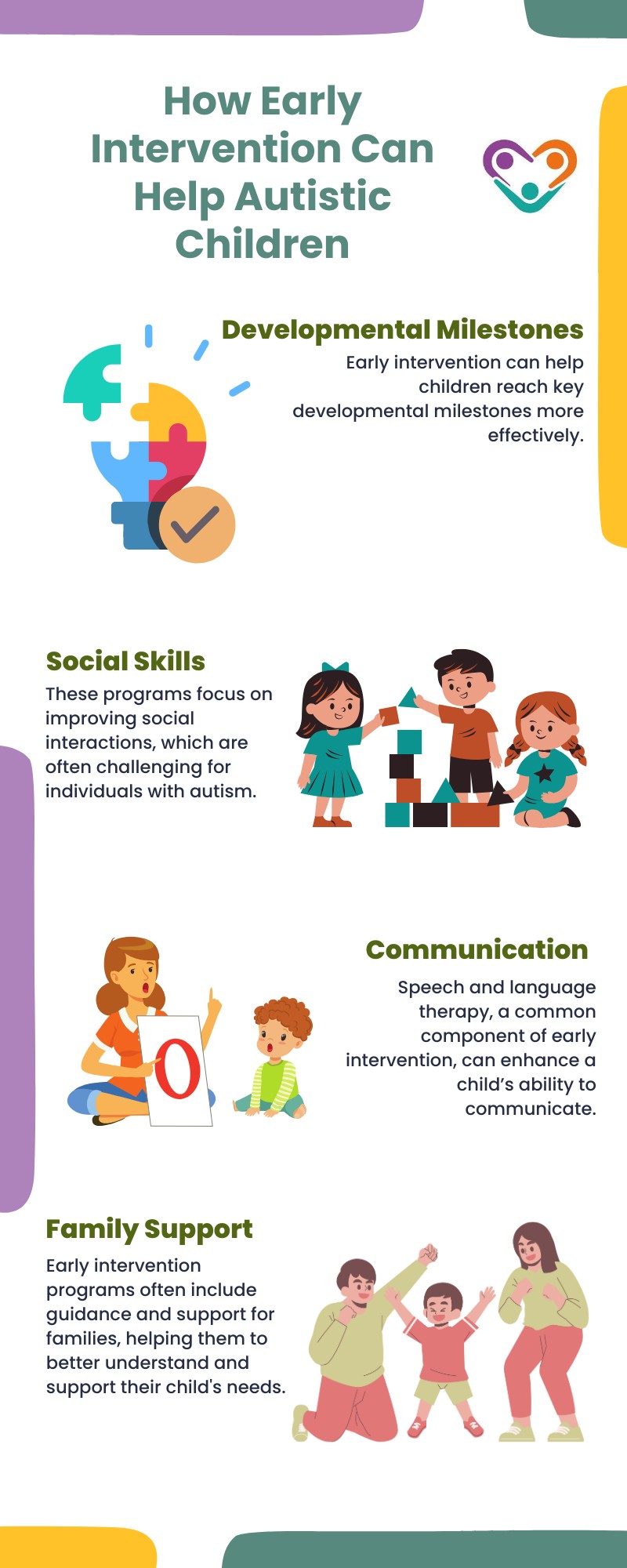Support and programs for autism play a crucial role in enhancing the quality of life for individuals on the autism spectrum. These resources provide structured assistance to address various aspects of daily living, including communication, social interaction, education, and behavior management.
Proper support helps autistic individuals develop essential skills, fosters their integration into the community, and offers much-needed relief and guidance for parents and caregivers.
Such support systems can significantly create a more inclusive environment while promoting personal development and independence. By understanding and accessing these resources, families and individuals with autism can more effectively navigate the challenges associated with autism spectrum disorder.
Types of Support Available for Autism
Several types of support are available to individuals with autism and their families. These programs cater to different needs and stages of life, ensuring that each person receives appropriate assistance based on their unique requirements.
Let’s look at each of them.
Early Intervention Programs
Early intervention programs focus on children from birth to age three and aim to address developmental delays as soon as possible. These programs include speech, occupational, and physical therapy to support early development.
Behavioral Therapy Programs
Behavioral therapy, particularly Applied Behavior Analysis (ABA), is widely utilized to improve specific behaviors such as communication, social skills, and daily living activities. Other types of behavioral therapies include Cognitive Behavioral Therapy (CBT) and Developmental, Individual-differences, and Relationship-based (DIR) therapy.

Educational Support Programs
Educational support is critical for school-aged children with autism. This includes Individualized Education Plans (IEPs) that tailor educational goals to each child’s needs and inclusive classroom settings that support learning in less restrictive environments.
Community and Recreational Programs
These programs provide opportunities for social interaction and leisure activities, promoting social skills and overall well-being. Examples include social skills groups, sports teams, and arts and crafts classes.
Parent and Caregiver Support Programs
Support groups and resources for parents and caregivers are essential for sharing experiences, advice, and emotional support. These programs offer a platform for caregivers to connect and receive guidance on managing the daily challenges of raising a child with autism.
Identifying and utilizing the appropriate support helps families and autistic individuals better navigate their everyday lives and enhance their personal growth and community involvement.
Early Intervention Programs
Early intervention programs play a crucial role in the development and growth of individuals with autism. These programs provide critical support during the formative years, helping to enhance communication, social skills, and cognitive development.
That said, early intervention is vital for children with autism because it can significantly impact their developmental trajectory. Engaging children in structured support programs during their early years can help mitigate developmental delays and improve long-term outcomes.
Here are the different ways early intervention can be beneficial:

On a side note, there are various types of early intervention programs designed to cater to the unique needs of children with autism. Each program offers specialized strategies to support the child’s development.
These are as follows:
- Speech-Language Therapy: Enhances verbal and non-verbal communication, improves social interaction.
- Occupational Therapy: Sensory integration techniques, improvement of coordination, and self-care skills.
- Physical Therapy: Exercises to improve balance, strength, and overall physical development.
- Applied Behavior Analysis (ABA): Positive reinforcement, customized behavior plans, focused on specific skills.
- Developmental Therapy: Play-based activities, family involvement, improvement of overall developmental skills.
These early intervention programs are tailored to meet the diverse needs of children with autism, providing them with the necessary tools and support to thrive. By engaging in these programs early on, children with autism can develop essential skills that will benefit them throughout their lives.
Behavioral Therapy Programs
Behavior analysis, often referred to as Applied Behavior Analysis (ABA), is a widely recognized method for supporting individuals with autism. This scientific approach focuses on understanding behavior and how it is affected by the environment.
The goal is to improve social behaviors and reduce challenging behaviors through positive reinforcements and structured interventions.
ABA therapy is data-driven and individualized, making it a tailored approach that addresses the unique needs of each person with autism. Practitioners assess specific behaviors and implement strategies to teach new skills, enhance communication, and promote independence.
There are various types of behavioral therapy programs available for individuals with autism. Each type is designed to address different aspects of behavior and development.
They’re as follows:
- Discrete Trial Training (DTT): A structured ABA technique that breaks down skills into small, manageable steps. Each skill is taught in a series of trials, with prompts and rewards used to reinforce positive behaviors.
- Pivotal Response Treatment (PRT): Focuses on pivotal areas of development, such as motivation and response to multiple cues. It employs play-based activities to encourage natural learning.
- Early Intensive Behavioral Intervention (EIBI): Designed for young children, often under the age of five. It involves a high number of hours each week, with a focus on a broad range of skills, from communication to social interaction.
- Verbal Behavior Therapy (VBT): Concentrates on teaching communication using the principles of ABA. It stresses the functional aspects of language such as requesting items, labeling, and social interaction.
- Social Skills Groups: Facilitates the development of social interaction skills in a group setting. These groups use behavioral techniques to teach individuals how to interact appropriately with peers and adults.
Behavioral therapy programs, especially those grounded in behavior analysis, provide essential support for individuals with autism. Through these specialized interventions, individuals can acquire new skills, improve social interactions, and achieve greater independence.
Educational Support Programs
Education is a crucial aspect of development for individuals with autism. Effective educational support programs can help enhance learning and social skills.
Two key components of these programs are Individualized Education Plans (IEPs) and special education along with inclusive classroom programs.
Individualized Education Plans (IEPs)
Individualized Education Plans (IEPs) are tailored educational plans designed to meet the specific needs of students with autism. These plans are developed collaboratively by educators, parents, and specialists to ensure that each child receives the appropriate support and resources necessary for their success.
The components of an IEP are as follows:
- Personalized Goals: Setting specific, measurable objectives for academic and social development.
- Specialized Instructions: Adapting teaching methods and materials to cater to the student’s learning style.
- Related Services: Providing necessary services such as speech therapy, occupational therapy, or counseling.
- Progress Monitoring: Regularly assessing and adjusting the education plan based on the child’s progress.
Special Education and Inclusive Classroom Programs
Special education programs focus on providing specialized instruction to meet the unique learning needs of students with autism. These programs are designed to create a supportive learning environment that fosters academic and social growth.
Inclusive classroom programs integrate students with autism into general education classrooms. This approach promotes inclusivity and allows students with autism to interact with their peers while receiving the necessary support.
Community and Recreational Programs
Community and recreational programs play a crucial role in enhancing the quality of life for individuals with autism. By providing opportunities for social interaction and leisure activities, these programs foster inclusivity and personal growth.

Social Skill Development Programs
Social skill development programs are designed to help individuals with autism navigate social interactions more effectively. These programs focus on improving communication skills, understanding social cues, and building relationships.
Participants often engage in role-playing, interactive activities, and guided discussions to enhance their social skills. The support provided by facilitators and peers helps individuals apply these skills in real-world scenarios.
Recreational and Leisure Programs
Recreational and leisure programs offer a variety of activities that cater to the interests and abilities of individuals with autism. These programs promote physical health, creativity, and social engagement.
Sports programs may include swimming, soccer, or gymnastics, providing opportunities for physical exercise and teamwork. Art and music classes enable self-expression and sensory experiences, while outdoor adventures encourage confidence and social interaction.
Participating in these community and recreational programs will help individuals enjoy fulfilling social lives, engage in meaningful activities, and develop essential life skills.

The Bottom Line
Access to a wide range of support and programs empowers individuals with autism and their families to navigate daily challenges and embrace growth opportunities. From educational resources and therapeutic services to community groups and advocacy organizations, these tools create a foundation for building stronger, more inclusive lives.
Taking advantage of these available options allows everyone to contribute to a supportive environment where individuals with autism can thrive and achieve their fullest potential.
Together, we can make a meaningful difference in fostering understanding, acceptance, and lasting positive change. At Golden Care Therapy, we provide ABA therapy in New Jersey, Indiana, New York, Georgia, and Florida, with a commitment to delivering personalized and compassionate care.
Our experienced team is dedicated to empowering families and helping individuals achieve their full potential. Reach out to us today so we can support your journey.
Sources:



